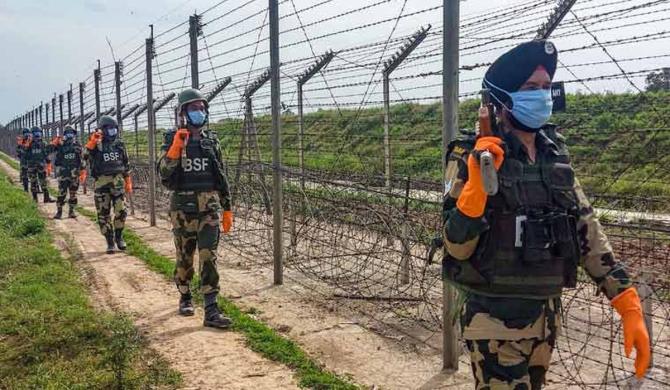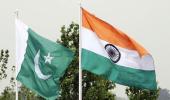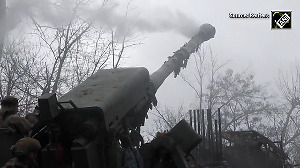'Their deteriorating economic and international situation is also responsible for being more reasonable.'

"Anything that leads to reduction of tensions and stopping of violence on the Line of Control is to be welcomed. However, I won't call it a rapprochement," says Tilak Devasher, former special secretary, Cabinet Secretariat and currently member, National Security Advisory Board.
"At best it could be described as baby steps to manage the bilateral relations between India and Pakistan in a peaceful manner."
In February, the armies of both countries announced a ceasefire in a joint statement.
The United Arab Emirates ambassador to the US confirmed that the UAE was 'mediating' between India and Pakistan to help them have a 'healthy and functional relationship'.
Ambassador Yousef Al Otaiba told Stanford University's Hoover Institution last week that the UAE played a role 'in bringing Kashmir escalation down and created a ceasefire, hopefully ultimately leading to restoring diplomats and getting the relationship back to a healthy level',' Reuters reported.
Subsequently, Pakistan Foreign Minister Shah Mehmood Qureshi told the Gulf News newspaper that the UAE was trying to bring both countries towards resuming talks with each other.
Thye ministry of external affairs has refrained from confirming or commenting on the matter so far.
"There are reports in the media about the UAE playing a role. However, I don't have any information on this," says Devasher.
The author of three highly acclaimed books on Pakistan, Devasher has a deep understanding of the complexities of India-Pakistan relations and feels India has always desired stable relations with Pakistan.
"From the Indian side, we were always willing so long as Pakistan stopped fomenting terror in India, especially in J&K," says Devasher.
India and Pakistan have had back channel meetings in the past. The national security advisers of both countries met in Bangkok in 2015. The meeting reportedly took place after Prime Minister Modi and his then Pakistan counterpart Nawaz Sharif met at the Paris Climate Summit.
"The advantage of back channel meetings is that they are away from the glare of publicity. Open meetings are dissected minutely by the media and commentators making it difficult for two sides to discuss various options. This is not so in the case of back channel," says Devasher.
The interlocutors assigned by respective governments have a mandate cleared by the top leadership.
Sometimes it is understood that such behind the scenes meetings are largely conducted by intelligence officers.
It is not so.
"Back channel negotiations are not necessarily handled by intelligence officers. At many times, diplomats have handled them. It all depends on the experience of the person and the trust that the leadership has in him/her," says Devasher.
"The basic tool is the mandate given by the leadership, but there is also a fair amount of flexibility to explore all options."
One of the most important results of a breakthrough or easing of tensions would be the release of Commander Kulbhushan Jadhav, who Pakistan claims is a Research and Analysis Wing agent. RA&W is India's external intelligence agency.
Commander Jadhav, a retired Indian Navy officer, has been in Pakistan's custody since late 2016.
"It is possible though the case has got complicated due to the legal processes involved. These will have to be factored in," says Devasher.
Commande Jadhav -- who turned 51 on April 16 -- was sentenced to death on charges of espionage by a Pakistan military court. The International Court of Justice stayed the execution and instructed Pakistan to provide consular access which Pakistan adhered to only once.
Last week, the Islamabad high court asked India to appoint a lawyer to represent Commander Jadhav to implement the International Court of Justice's verdict.
Sharing light on the intelligence establishments of India and Pakistan, Devasher says that the two are not comparable.
"Indian intelligence agencies are purely intelligence agencies while in Pakistan they are security agencies with power of enforcement and arrest. This does not happen in India," says says Devasher, a retired RA&W officer.
Is this latest overture for peace from Pakistan Army Chief General Qamar Javed Bajwa a consequence of India's aggressive and offensive response on the Line of Control since the surgical strikes?
"It is true that India has of late adopted a much more aggressive posture when faced with terrorist attacks on our soil from Pakistan. As a result, Pakistan has realised that it is no longer business as usual. Their deteriorating economic and international situation is also responsible for being more reasonable," adds Devasher.
India has had a year-long stand-off with China on the Line of Actual Control. Talks on disengagement have yet to restore status quo ante. The latest round of military dialogue indicated a Chinese refusal to pull back from Gogra, Hot Springs and Depsang.
Considering China remains Pakistan's all-weather friend, India has reason to be wary of the Pakistan-China nexus.
"Pakistan and China enjoy close relations and both have boundary problems with India. So naturally we have to be mindful of any collusive activity between them," says Devasher.
On whether Pakistan can be trusted with its signals of peace this time around?
"It is a question of national interest," says Devasher.
"Trust is not as important as securing your national interest."
Feature Presentation: Aslam Hunani/Rediff.com











 © 2025
© 2025